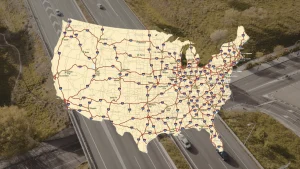Truckers and transporters need to consider several key aspects in their strategies and operations
Trimble has released the report “The Road Ahead: Key Trends and Capabilities Shaping the North American Freight Transportation Market,” prepared by Transporeon. This document identifies the key trends that will influence the future of truck freight transportation in North America. Based on surveys of Indago members and the Transporeon community, the report examines how technological solutions can address the current market challenges, which are characterized by an oversupply in the sector.
5 key points affecting the future of the north american road transport industry
In addition to navigating market fluctuations, truckers and transporters need to consider several key aspects in their strategies and operations. The report highlights five main trends, ranging from market challenges to sustainability and electric vehicles. Below are the conclusions for each topic and their impact on the industry.
1. Market Challenges
North American road freight transportation faces challenges due to low demand and excess capacity. The market is saturated, especially after a significant increase in the number of new carriers during the COVID-19 pandemic. According to FTR Transportation Intelligence, monthly registrations of new carriers increased from between 2,212 and 4,273 from January 2014 to May 2020 to 5,396 in July 2020, peaking at 10,904 in March 2022. The industry continues to face challenges related to driver recruitment, investment, and fuel prices, requiring adaptation.

2. Nearshoring
Nearshoring, driven by geopolitical volatility and sustainability goals, is a key trend for freight transportation. According to the report, Mexico was chosen by 60% of respondents as the top country companies plan to integrate into their supply chains over the next three years. The data supports this, as in 2023, there were 7,356,659 trucks moving from Mexico to the U.S., representing a 1.4% increase from the previous year. However, nearshoring still presents challenges, including fraud and potential cargo theft, which are major concerns for truckers.

3. Cargo Fraud
Cargo fraud is on the rise, with CargoNet reporting a 59% increase in cargo theft in the third quarter of 2023 compared to the previous year. Additionally, an April 2024 survey found that 48% of respondents experienced cargo theft or fraud in the past year. In response, the Federal Motor Carrier Safety Administration established a specialized team in April 2024 to address this issue. Technology, such as telematics and real-time cargo visibility, plays a crucial role in fraud prevention, and the industry continues to develop solutions to protect truckers and drivers.

4. Sustainability and Electric Vehicles
Sustainability and the adoption of green alternatives in U.S. freight transportation are highly debated and controversial topics. Obstacles such as limited range and lack of charging infrastructure hinder the adoption of electric vehicles by fleets. Although several projects have been proposed and launched in recent years, available subsidies are often insufficient or disrupted by the government. Moreover, electric trucks have higher prices, limited range, and longer charging times compared to diesel trucks, which leads many truckers and transporters to resist transitioning to electric vehicles.

5. Implications of California’s AB5 Law
California’s AB5 law requires the reclassification of many independent contractor drivers as employees, compelling transport companies to provide additional benefits and payroll taxes. The implementation of AB5 in the road transport sector, along with the potential adoption of similar laws in other states, could significantly impact operational capacity and costs.

In summary, the road transport industry is undergoing a phase of evolution and change. As these changes do not always benefit everyone equally, it is crucial to find a balance that serves the common good. Adaptation will be necessary, but it is also important to respect those who depend on this industry. Collaboration will be essential to achieve this goal.

United States Numbered Highway System: how does it work?
The U.S. Numbered Highway System provides an integrated national network of roads designed to facilitate long-distance travel. The numbering of U.S. highways follows a structured

In brief: weigh stations, young drivers, and fuel tax reform in the trucking industry
South Carolina debuts virtual weigh stations for trucking, as ATA pushes youth driver program, and states debate fuel policies. South Carolina launches virtual weigh stations

The Wildest Truck Modifications on the Road Today
Truck customization has become a serious industry, with some builds rivaling high-end RV conversions in complexity and cost. From redesigned sleepers to upgraded suspension systems, these modifications do more than change appearance — they alter weight, electrical load, and the technical profile of the truck.

The most dangerous states in the U.S. during winter weather
While winter conditions are hazardous across the country, some states experience significantly higher accident rates during this season. A study by Samsara, a safety and

Winter storm disruptions lead to FMCSA HOS relief in 40 states
Motor carriers and drivers providing direct assistance in relief efforts in the affected states are covered by a hours-of-service (HOS) exemption. Over the weekend, a

Air Quality Alert in California Impacts Transportation
An air quality alert has been issued as high levels of fine particle pollution (PM2.5) trigger health warnings across several parts of California. The situation is affecting visibility, driver health, and logistics operations, forcing transportation professionals to take extra precautions on highways and in urban corridors
